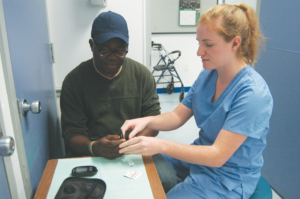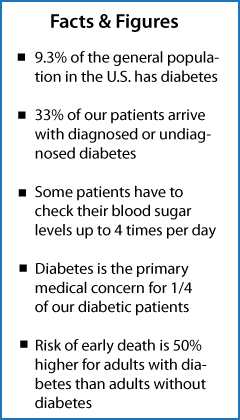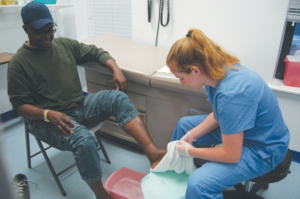
A patient and nursing assistant test blood sugar levels
 One-third of all Christ House patients are diabetic. As a result, managing this demanding disease is a central component of our medical care.
One-third of all Christ House patients are diabetic. As a result, managing this demanding disease is a central component of our medical care.
Our patients often present additional complications due to years of either neglecting to manage their diabetes or not even knowing that they have the disease. Complications can include heart disease, nerve pain, kidney disease, vision problems, and circulatory problems which delay healing of wounds. Severe circulatory problems may lead to amputations and limited mobility. Without intervention, a person with long-term, unmanaged diabetes has a higher risk of early death.
Managing diabetes requires a predictable schedule, the opportunity and ability for consistent exercise, and access to healthy food. These ideal conditions are rarely a reality for someone experiencing homelessness. Individuals who are homeless often do not have a choice in what, how much, or when they eat. And when their primary focus is on safety and survival, exercise is rarely a priority.Unlike some conditions which require taking just one pill every day or week, diabetics may need to adjust the amount and type of medication based on recent food intake and blood sugar levels. For those whose ability to plan meals and test levels is sporadic, not being able to adjust medication appropriately will make it less effective.

A nursing assistant provides a diabetic foot treatment
Another obstacle that we encounter is the thought that diabetes is unmanageable. Because some diabetics don’t believe that they can prevent complications, they ignore their disease altogether.
While a person experiencing homelessness certainly encounters high barriers to managing diabetes, we know that our patients can control their disease with proper education, encouragement, treatment of existing complications, and the building of a more stable future.
Our approach to diabetes treatment is two-fold. First, we stabilize a patient’s blood sugar levels and address any existing complications. Our medical team performs blood sugar checks during scheduled time slots each day. Many patients need to be checked two to four times a day as they stabilize and learn to eat properly. Next, we provide educational opportunities for patients to learn how to manage their condition once they become independent. We teach nutritional principles and the proper techniques for checking blood sugar levels and delivering insulin.
We will soon start a four-part series on diabetes in our weekly health promotion class. We believe this will benefit those who have been diagnosed with diabetes, those who are at risk to develop it in the future, and those who may have a friend or family member with the disease.
One former diabetic patient, Theodore, was cognitively and developmentally impaired. He could not grasp the principles of proper nutrition and after years of uncontrolled diabetes, his health declined rapidly. He lost the ability to work his long-term custodial job and was sent to Christ House with the goal of stabilizing his diabetes. With thoughtful and regular care from our medical staff, Theodore improved dramatically. He is now a member of the Kairos Program and with minimal support, he manages his diabetes and is able to volunteer and participate fully in community life.
While diabetes can be a daunting disease for someone who is already in a vulnerable state, we are determined to use every resource to minimize its effect on our patients’ lives. With your support, we will continue to help our patients take control of this disease and make a healthier future possible.





Hi, Thanks For Your Top-Notch Article. Actually, Many people can keep their blood glucose in a healthy range without medications (either oral diabetes medications or insulin injections) if they lose weight and keep their weight down, are regularly physically active, and follow a meal plan that helps them keep portion sizes under control and helps them spread the amount of carbohydrate they eat at each meal throughout the day.
I really appreciate your two-fold approach to diabetes treatment . By stabilizing blood sugar levels and providing educational opportunities, you’re addressing both immediate concerns and long-term management. This comprehensive approach not only improves patients’ health outcomes but also empowers them to live fulfilling lives while effectively managing their condition. Thanks for sharing these informative topics.